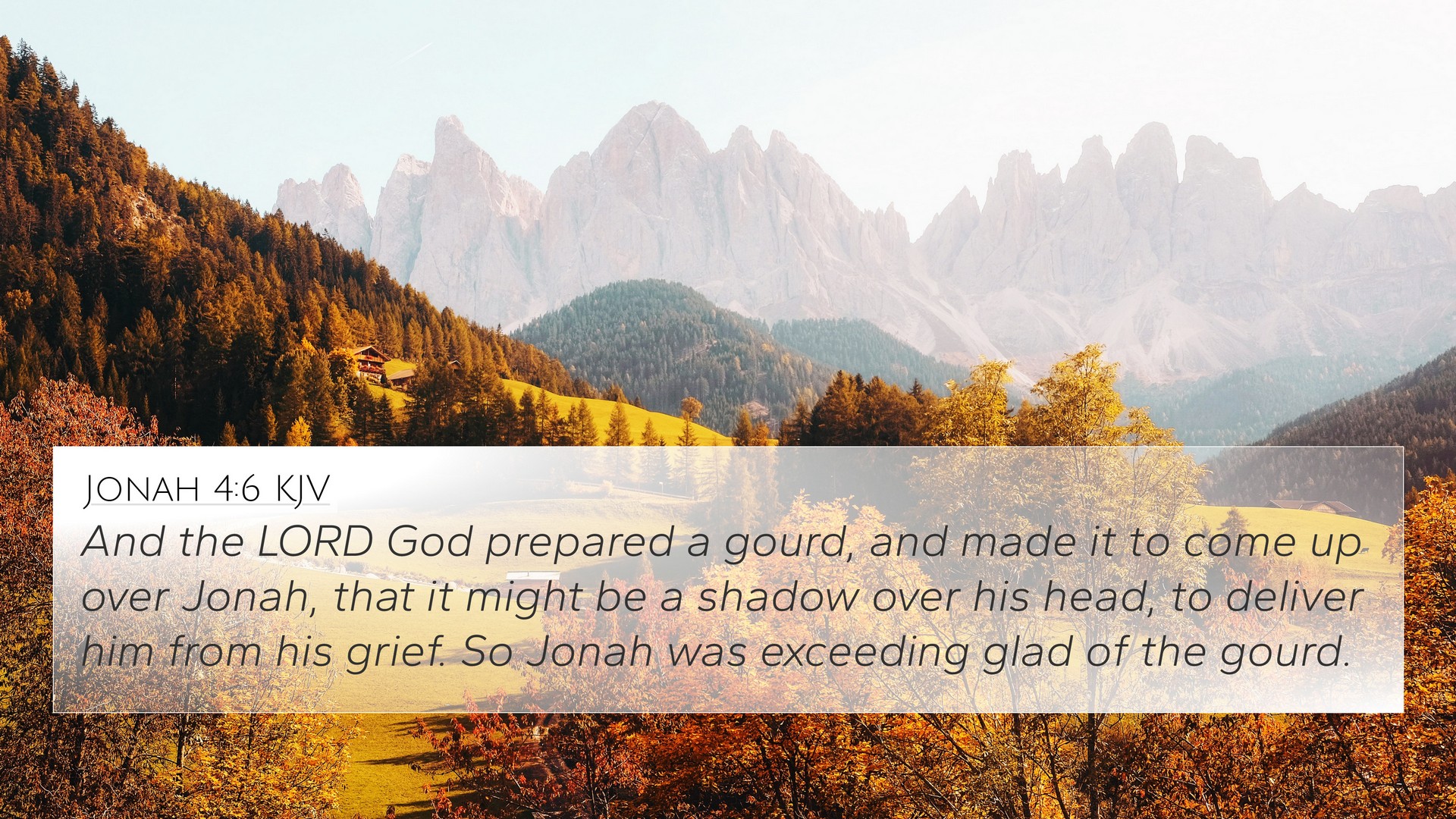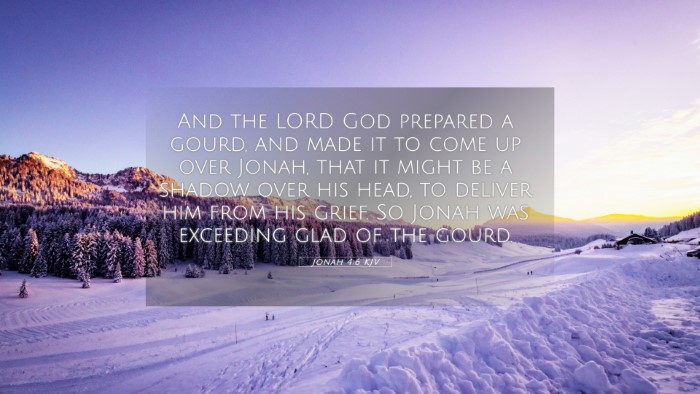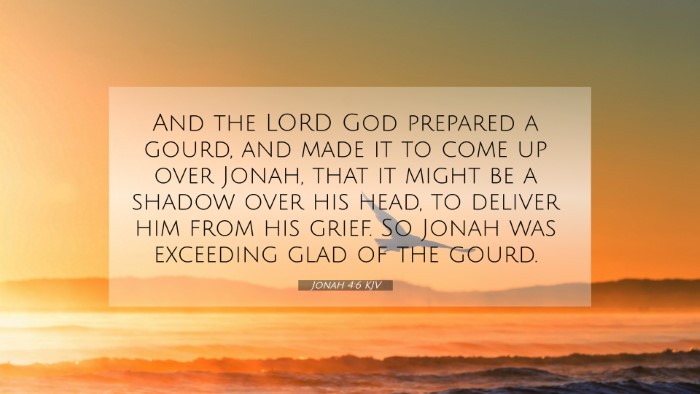Old Testament
Genesis Exodus Leviticus Numbers Deuteronomy Joshua Judges Ruth 1 Samuel 2 Samuel 1 Kings 2 Kings 1 Chronicles 2 Chronicles Ezra Nehemiah Esther Job Psalms Proverbs Ecclesiastes Song of Solomon Isaiah Jeremiah Lamentations Ezekiel Daniel Hosea Joel Amos Obadiah Jonah Micah Nahum Habakkuk Zephaniah Haggai Zechariah MalachiJonah 4:6 Similar Verses
Jonah 4:6 Cross References
And the LORD God prepared a gourd, and made it to come up over Jonah, that it might be a shadow over his head, to deliver him from his grief. So Jonah was exceeding glad of the gourd.
Uncover the Rich Themes and Topics of This Bible Verse
Listed below are the Bible themes associated with Jonah 4:6. We invite you to explore each theme to gain deeper insights into the Scriptures.
Jonah 4:6 Cross Reference Verses
This section features a detailed cross-reference designed to enrich your understanding of the Scriptures. Below, you will find carefully selected verses that echo the themes and teachings related to Jonah 4:6 KJV. Click on any image to explore detailed analyses of related Bible verses and uncover deeper theological insights.
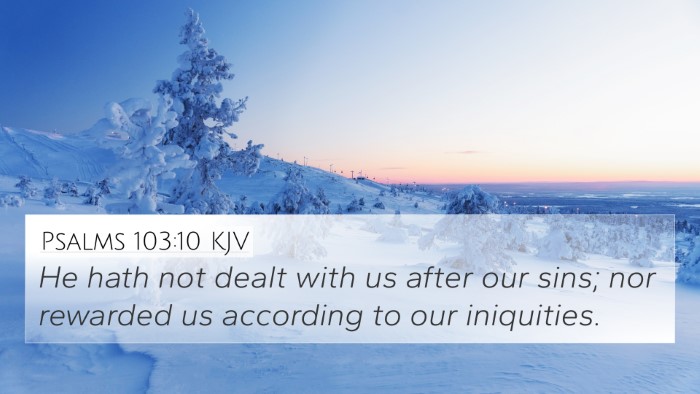
Psalms 103:10 (KJV) »
He hath not dealt with us after our sins; nor rewarded us according to our iniquities.
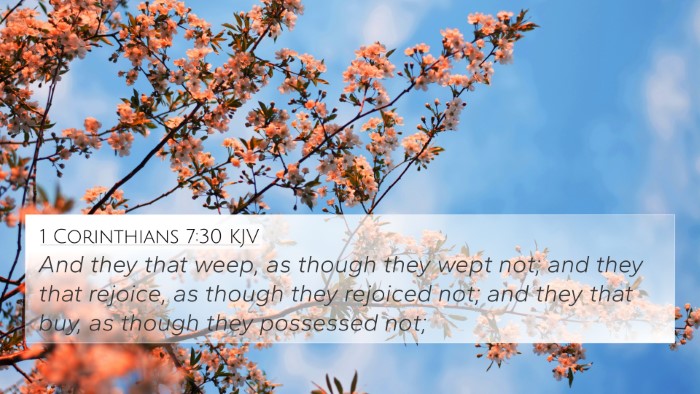
1 Corinthians 7:30 (KJV) »
And they that weep, as though they wept not; and they that rejoice, as though they rejoiced not; and they that buy, as though they possessed not;
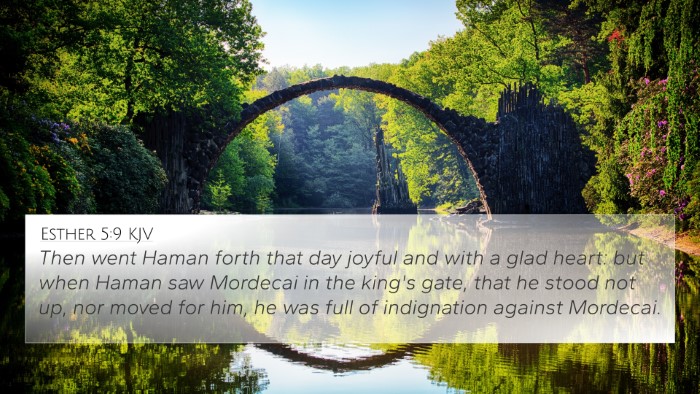
Esther 5:9 (KJV) »
Then went Haman forth that day joyful and with a glad heart: but when Haman saw Mordecai in the king's gate, that he stood not up, nor moved for him, he was full of indignation against Mordecai.
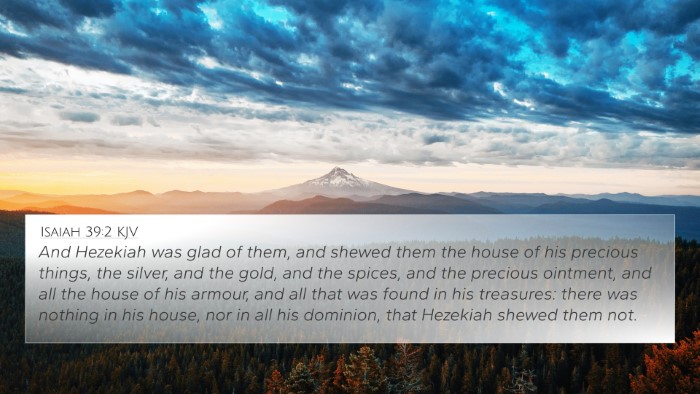
Isaiah 39:2 (KJV) »
And Hezekiah was glad of them, and shewed them the house of his precious things, the silver, and the gold, and the spices, and the precious ointment, and all the house of his armour, and all that was found in his treasures: there was nothing in his house, nor in all his dominion, that Hezekiah shewed them not.
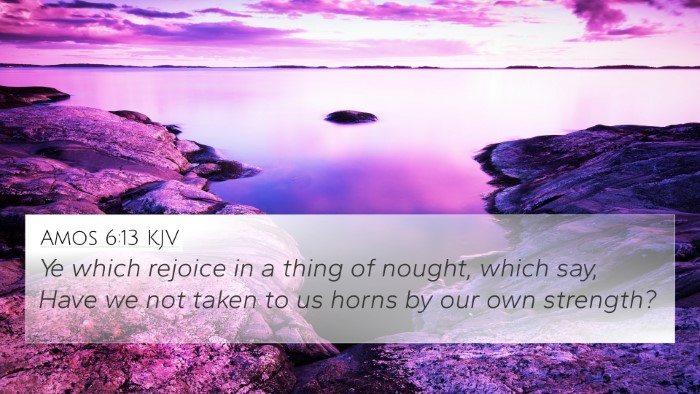
Amos 6:13 (KJV) »
Ye which rejoice in a thing of nought, which say, Have we not taken to us horns by our own strength?
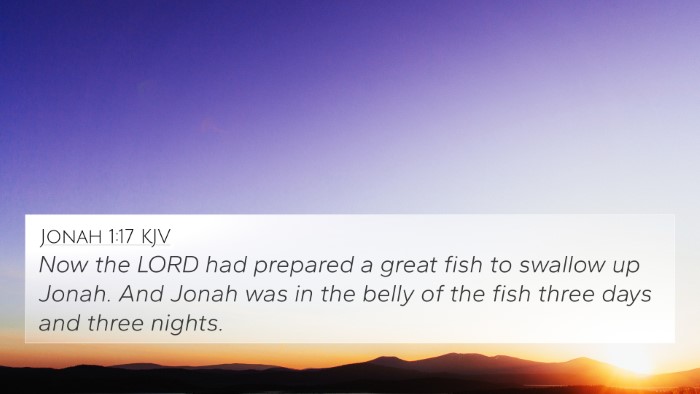
Jonah 1:17 (KJV) »
Now the LORD had prepared a great fish to swallow up Jonah. And Jonah was in the belly of the fish three days and three nights.
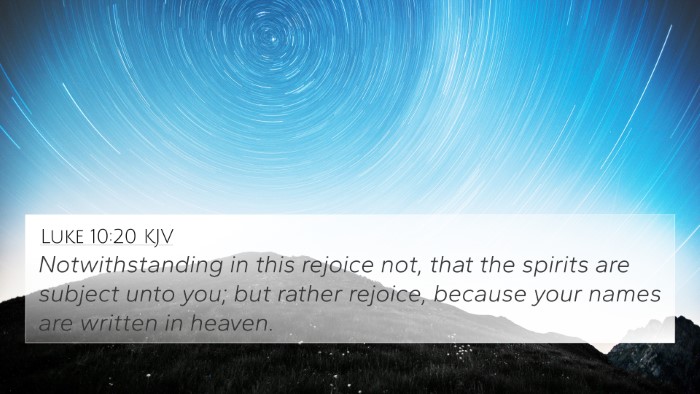
Luke 10:20 (KJV) »
Notwithstanding in this rejoice not, that the spirits are subject unto you; but rather rejoice, because your names are written in heaven.
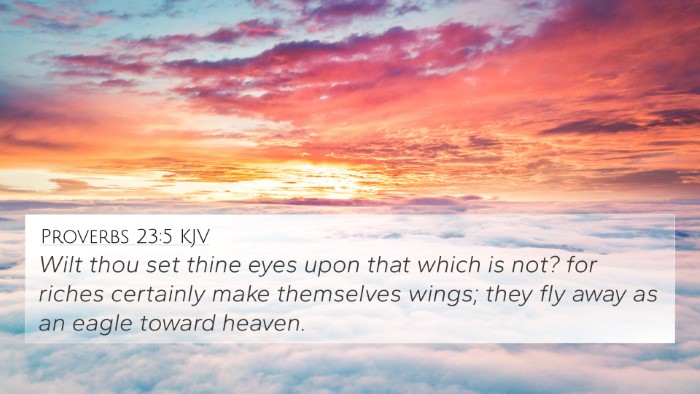
Proverbs 23:5 (KJV) »
Wilt thou set thine eyes upon that which is not? for riches certainly make themselves wings; they fly away as an eagle toward heaven.
Jonah 4:6 Verse Analysis and Similar Verses
Meaning and Interpretation of Jonah 4:6
Jonah 4:6 reads: "And the Lord God prepared a gourd, and made it to come up over Jonah, that it might be a shadow over his head, to deliver him from his grief. So Jonah was exceeding glad of the gourd." This verse captures a significant moment where God provides Jonah with comfort in the midst of his distress, showcasing God's grace even in the face of Jonah's stubbornness.
Summary of Insights from Public Domain Commentaries
-
Matthew Henry:
Matthew Henry notes that God's provision of the gourd illustrates His mercy and care for Jonah, even when he is displeased with God's plans. Henry emphasizes that God can provide relief and encourage His servants, even when they struggle with their duties and feelings.
-
Albert Barnes:
Albert Barnes points out that the gourd served as a symbol of God's protection. He explains that God often gives His children comfort and a respite from their troubles, which can provoke a grateful reaction, as seen with Jonah's gladness for the gourd.
-
Adam Clarke:
Adam Clarke reflects on the gourd as an indication of God's power to bring life from death. He indicates that Jonah's joy over the gourd contrasts sharply with his earlier despair about Nineveh's repentance, revealing a deeper lesson about the nature of God's compassion and Jonah's misaligned priorities.
Bible Cross-References Related to Jonah 4:6
Jonah 4:6 has various connections and parallels within scripture that expand on the themes of God's mercy, comfort, and the nature of repentance. The following are notable cross-references:
- Exodus 16:14-15: God's provision of manna, showcasing His care for His people.
- Matthew 5:45: God’s impartial grace given to all, including those who may not deserve it.
- Psalms 104:14-15: References to God’s provision of plants for nourishment and joy.
- 1 Kings 19:5-6: The story of Elijah and God’s provision of food when he was discouraged.
- Philippians 4:19: Assurance that God will supply all needs according to His riches.
- Isaiah 49:10: God’s provision for His people, providing comfort in desolate times.
- 2 Corinthians 1:3-4: God comforts us in our tribulations so we can comfort others.
Understanding Connections Between Bible Verses
To grasp the full meaning of Jonah 4:6, it is essential to engage in Bible verse cross-references and linking Bible scriptures that share similar themes or lessons. By understanding these connections, readers can form a broader understanding of God's nature and His relationship with humanity.
Using tools for Bible cross-referencing, one can identify not just isolated verses but also the larger scriptural context that enfolds Jonah's experiences. For instance, like Jonah, many figures in the Bible experience God's merciful intervention amidst personal turmoil, which creates thematic Bible verse connections that enhance comprehension of God's overarching narrative.
Examples include:
- Gideon’s doubt (Judges 6) compared to Jonah’s reluctance.
- Elijah’s discouragement in 1 Kings 19 versus Jonah's frustration.
- David's cries for help and God's deliverance in Psalms.
Conclusion
In examining Jonah 4:6 through the lens of various public domain commentaries, we can appreciate the many dimensions of God's character as revealed in scripture. This verse serves not only as a personal reflection for Jonah but also invites readers to consider their own responses to God's mercy and provision. Through the insights of Matthew Henry, Albert Barnes, and Adam Clarke, layers of meaning are revealed, urging us to engage in deeper study with Bible concordance, and reflect upon cross-referenced themes in the Bible.
